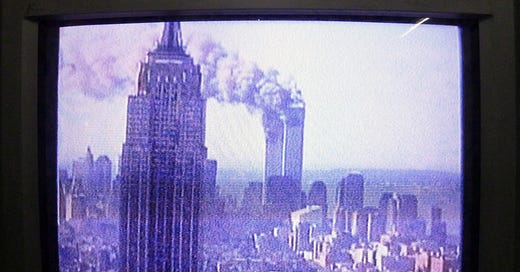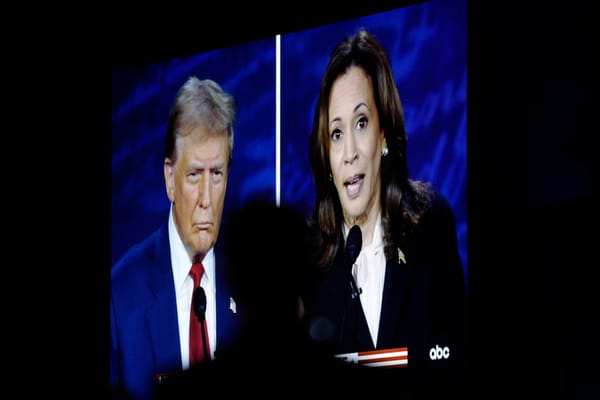The question of whether or not it’s appropriate to make 9/11 jokes appears not to prick the consciences of those born after 2001. On this year’s anniversary, the internet was flooded with more 9/11 memes than I have ever seen before, much to the ire of those who were directly impacted by the catastrophe—especially New Yorkers.
Surely, nihilistic, “irony-pilled” jokes which trivialize suffering merit moral censure. Yet the slew of memes also reflect the collective disillusion with the “grand narrative” fed to Americans post-9/11 of an “axis of evil” that is out to destroy American freedom. In his documentary Bitter Lake, Adam Curtis traces this narrative’s development from the Reagan to Bush eras, demonstrating how politicians colluded with mass media to forge a Manichean picture absolving the United States and Britain of their hand in backing Islamist regimes in the region.
These viral memes are a reflection of how much critiques of the West’s dogmatic glorification of neoliberalism, secularism, and interventionist policy and questioning the “official story” have made their way from the fringes of respectable discourse and into the mainstream.
These memes are also a more crude iteration of the “spectacle” that TV networks had already turned the event into. Baudrillard once theorized that the broadcasting of violent events “out there”—that is, outside of the safety of our private spheres—glues us to our screens because they enable us both to perceive our security “more deeply as security,” and to project our moral guilt for living “passive” lives of hedonistic consumption onto “bad guys” other there.
Rene Girard put it more bluntly: “On September 11, people were shaken, but they quickly calmed down…Western rationalism operates like a myth: We always work harder to avoid seeing the catastrophe.” Thus he warned us that “the only way we will be able to meet the terrorist challenge is by radically changing the way we think.”
This week in Compact
Such manufacturing of narratives and vibes was on full display in mainstream coverage of Tuesday night’s debate. Meanwhile in Compact’s pages, Ryan Zickgraf attempts to get to the bottom of it all—acknowledging that while Harris’s “vibes” were more compelling than Trump’s at the debate, “the fact that the vice president can successfully prosecute the case against Trump helps conceal the reality that she has retreated from the Biden administration’s post-neoliberal economic vision.
“For those who worried that she would ditch Bidenism’s more economically populist elements,” Sohrab Ahmari says that Harris’s new issues document has a few encouraging things. But “for those who know that 2024 is the immigration election, and that Harris has been on the wrong side of the issue,” it offers “little hope.”
“Presidential elections rarely turn on foreign-policy issues,” concede Jennifer Kavanagh & Quinn Marschik, but they argue that neither Trump nor Harris should “should take the bait” from Taiwan’s backers “to make commitments that signal American resolve.”
Michael Stumo argues that Trump, “by bringing tariffs back into the mainstream” is “advocating for a return to trade policies that have proven effective across generations—from Hamilton and Clay to McKinley—and have been advocated by leading economists. With tariffs as part of a broader economic growth strategy, America can build a more balanced, prosperous, and resilient economy.”
Justin Trudeau’s announcement that 70,000 foreign students and even more temporary foreign workers will “have to go back” sent shockwaves throughout Canada about his apparent “about face.” But Leila Mechoui writes that this isn’t surprising, as Canada “has been gradually signaling an end to its ultra-permissive immigration policy.”
On the occasion of Ukraine’s Independence Day last month, President Volodymyr Zelenskyy signed into law a bill banning Ukrainian religious organizations from working together with the Russian Orthodox Church. Thomas Fazi writes that “it is no secret” that the ban is directed against the Ukrainian Orthodox Church. “Such an attack on religious freedom marks a disturbing development in a war in which nothing is off-limits.”
La France profonde (deep France) “has emerged as a recurring motif in French politics,” writes Harry Readhead. It also undergirds a new book by T.D. Allman on the French town of Lauzerte, who Readhead says “traces with obvious pride and enthusiasm the contours of this hillside town’s people and their history and, in doing so, throws light on a question that seems now to hang over France and, perhaps, much of the West. To borrow from Plotinus: ‘But we—who are we?’”
Hear more about the debate on this week’s podcast episode. And check out Sohrab Ahmari’s newsletter on Wall Street’s lobbying for China.
Amusing ourselves to death (and new life?)
While scrolling through 9/11 videos on YouTube this week, I came across some recently-uploaded amateur camcorder footage taken by New Yorkers on the ground. These videos cut through the ironic memeification of the event, as they document the brutal sense of horror which overtook these everyday folk. But they also give you a glimpse of their uncrushable spirit, of their chutzpah and gruff, no-BS attitude—especially of the blue-collar and emergency workers. Aaron Renn wrote in our pages last week about how this energetic spirit has been driven out of the city by gentrification and corporatization…though if you look closely, you’ll see that pockets of it still remain.
Perhaps one of the best fictionalized depictions of post-9/11 New York is Christopher Beha’s 2014 novel Arts and Entertainments. A brilliant, witty, and hilarious satire of reality television and celebrity culture, the book captures aspects of the “society of the spectacle” that few theorists have been able to convey in their works. Above all, it manages to cast a spotlight on the effect that our entertainment-obsessed culture has on a person’s soul, and alludes to a potential path out of “the matrix.”





